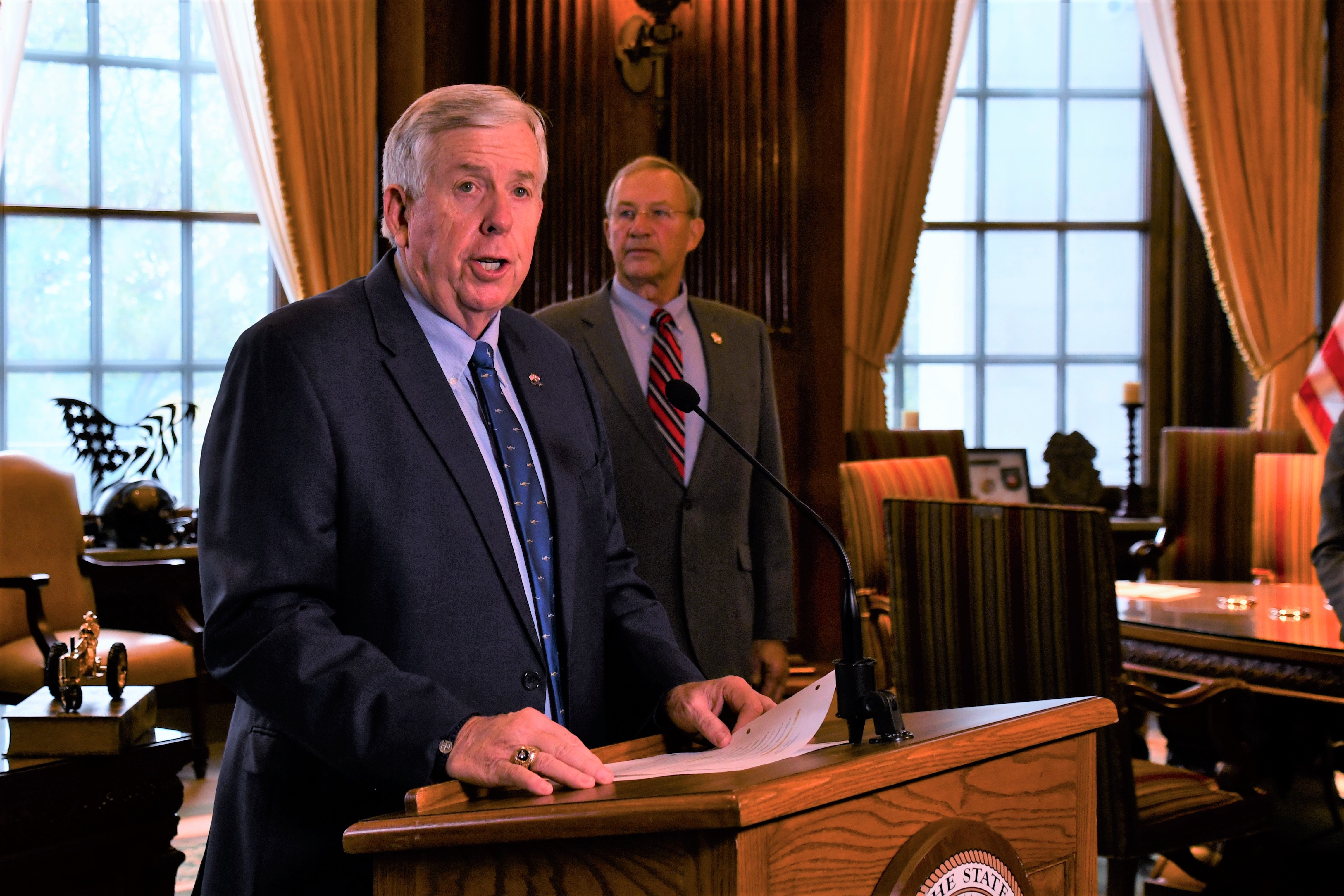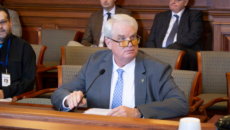JEFFERSON CITY, Mo. — Gov. Mike Parson signed an executive order Tuesday creating a statewide campaign to “educate, warn, and discourage vaping among Missouri’s youth.”
It is already illegal for anyone under the age of 18 to purchase or use vaping products. However, the Republican governor said there’s been an influx of youth across the country, including in Missouri, who are vaping. He said the number of middle and high school students who use these products have jumped to nearly 27 percent last year from around 19 percent in 2014.
Missouri’s first vaping-related death was confirmed last month.
The executive order directs the Departments of Health and Senior Services (DHSS), Elementary and Secondary Education (DESE), and Public Safety (DPS) to coordinate a statewide campaign within the next 30 days to relay the health risks of vaping for young people. The departments will have to use existing resources — meaning additional funding will not be thrown their way for the campaign.
Additionally, the order directs the departments to review cases and vaping-related injuries and tailor campaigns to counter-market to youth.
“This is truly an epidemic, and we must take action to protect the young people of our state,” Parson told reporters Tuesday morning.
As for an outright ban, Parson said more education and research was needed, pointing to the legislature to “take a look at this” during the next session.
“We’ve just got to see what’s on the table. First of all, I think we’ve got to get something on the federal level lined up … and see where we’re going to move forward on legislation,” Parson said.
There have been 23 confirmed cases of vaping-related illnesses in Missouri since DHSS began requiring the state’s doctors to report potential instances of pulmonary illnesses in August. There has been one confirmed death, a man in his mid-40s who died in a St. Louis hospital in September.
DHSS Director Randall Williams told The Missouri Times last month the cases seen in the state track with trends at the national level: The median age for someone with a pulmonary illness related to e-cigarette use is 19, and the majority of cases are male.
And a “common denominator” seems to be tampering with devices, he said.
“People are taking a device and using it in a way it’s not intended to be used or putting something in it that it wasn’t intended to have,” Williams said. “Many of these patients are using THC, tampering with the device in some way, or [are] using vitamin E to thicken the solution that’s heated up.
As of Oct. 8, 1,299 lung injury cases related to vaping or e-cigarette use have been reported to the Center for Disease Control and Prevention (CDC), stemming from 49 states, the District of Columbia, and one U.S. territory. Additionally, 26 deaths have been confirmed in 21 states.
The CDC said most patients reported using products containing THC, and the “latest national and state findings suggest products containing THC, particularly those obtained off the street or from other informal sources … are linked to most of the cases and play a major role in the outbreak.”
The Trump administration has floated a ban on certain flavored e-cigarettes. And some states, such as New York and Michigan, have already enacted bans or restrictions on vaping products. (Albeit, a court has halted the ban in New York for now.)
Inhalational injuries cause permanent damage but will not spread from person to person. People who use e-cigarettes have reported experiencing coughing, shortness of breath, chest pain, nausea, diarrhea, fatigue, fever, weight loss, or an elevated heart rate.
Following Parson’s announcement, House Minority Leader Crystal Quade lambasted Parson over his vote as a state senator to override a gubernatorial veto of a bill related to e-cigarettes in 2014. While the bill, which ultimately went into effect, did exempt e-cigarettes from certain regulations and taxes imposed on tobacco products in Missouri, it also made the products illegal for minors in Missouri.
“That vote to protect vaping industry profits has not aged well, and it is encouraging Governor Parson now recognizes the significant threat to public health vaping poses,” Quade said in a statement. “A good place to begin in addressing this crisis would be for the governor to support repealing the shortsighted, pro-industry legal protections that have helped addict another generation of young Missourians to nicotine, and in some cases cost them their lives.”
The American Lung Association applauded Parson’s order Tuesday.
“From our decades of experience in tobacco control efforts, we know that public awareness campaigns can make a meaningful impact on tobacco use. This is a great first step to implement a comprehensive tobacco control plan in Missouri, and we look forward to working with the governor and legislators to address this critical health issue,” Leah Martin, director of advocacy, said in a statement to The Missouri Times. “The youth e-cigarette epidemic is nothing short of a public health emergency that must be urgently confronted.”

Kaitlyn Schallhorn was the editor in chief of The Missouri Times from 2020-2022. She joined the newspaper in early 2019 after working as a reporter for Fox News in New York City.
Throughout her career, Kaitlyn has covered political campaigns across the U.S., including the 2016 presidential election, and humanitarian aid efforts in Africa and the Middle East.
She is a native of Missouri who studied journalism at Winthrop University in South Carolina. She is also an alumna of the National Journalism Center in Washington, D.C.
Contact Kaitlyn at kaitlyn@themissouritimes.com.

















